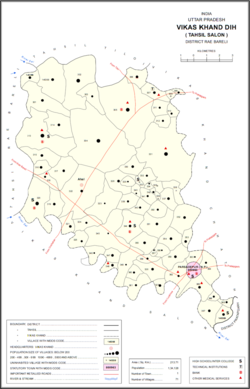Goera is a village in Dih block of Rae Bareli district, Uttar Pradesh, India.[2] It is located 21 km from Raebareli, the district headquarters.[3] As of 2011, it has a population of 619 people, in 142 households.[2] It has no schools and no healthcare facilities, and it does not host a permanent market or weekly haat.[2] It belongs to the nyaya panchayat of Dih.[4]
Goera | |
|---|---|
Village | |
 Map showing Goera (#324) in Dih CD block | |
| Coordinates: 26°06′13″N 81°24′37″E / 26.103734°N 81.410206°E[1] | |
| Country | |
| State | Uttar Pradesh |
| District | Raebareli |
| Area | |
• Total | 1.57 km2 (0.61 sq mi) |
| Population (2011)[2] | |
• Total | 619 |
| • Density | 390/km2 (1,000/sq mi) |
| Languages | |
| • Official | Hindi |
| Time zone | UTC+5:30 (IST) |
| Vehicle registration | UP-35 |
The 1951 census recorded Goera (as "Goira") as comprising 1 hamlet, with a total population of 267 people (134 male and 133 female), in 58 households and 53 physical houses.[5] The area of the village was given as 401 acres.[5] 13 residents were literate, all male.[5] The village was listed as belonging to the pargana of Parshadepur and the thana of Salon.[5]
The 1961 census recorded Goera (as "Goira") as comprising 2 hamlets, with a total population of 289 people (141 male and 148 female), in 61 households and 60 physical houses.[6] The area of the village was given as 401 acres.[6]
The 1981 census recorded Goera as having a population of 324 people, in 96 households, and having an area of 157.83 hectares.[3] The main staple foods were listed as wheat and barley.[3]
The 1991 census recorded Goera as having a total population of 505 people (250 male and 255 female), in 104 households and 104 physical houses.[4] The area of the village was listed as 158 hectares.[4] Members of the 0-6 age group numbered 116, or 23% of the total; this group was 51% male (49) and 55% female (57).[4] Members of scheduled castes made up 42% of the village's population, while no members of scheduled tribes were recorded.[4] The literacy rate of the village was 18% (71 men and 18 women).[4] 141 people were classified as main workers (135 men and 6 women), while 37 people were classified as marginal workers (all women); the remaining 304 residents were non-workers.[4] The breakdown of main workers by employment category was as follows: 114 cultivators (i.e. people who owned or leased their own land); 22 agricultural labourers (i.e. people who worked someone else's land in return for payment); 0 workers in livestock, forestry, fishing, hunting, plantations, orchards, etc.; 0 in mining and quarrying; 0 household industry workers; 0 workers employed in other manufacturing, processing, service, and repair roles; 0 construction workers; 0 employed in trade and commerce; 0 employed in transport, storage, and communications; and 5 in other services.[4]
References
edit- ^ "Geonames Search". Do a radial search using these coordinates here.
- ^ a b c d e "Census of India 2011: Uttar Pradesh District Census Handbook - Rae Bareli, Part A (Village and Town Directory)" (PDF). Census 2011 India. pp. 393–409. Retrieved 15 October 2021.
- ^ a b c Census 1981 Uttar Pradesh: District Census Handbook Part XIII-A: Village & Town Directory, District Rae Bareli (PDF). 1982. pp. 212–3. Retrieved 15 October 2021.
- ^ a b c d e f g h Census 1991 Series-25 Uttar Pradesh Part-XII B Village & Townwise Primary Census Abstract District Census Handbook District Raebareli (PDF). 1992. pp. xxiv–xxviii, 240–1. Retrieved 15 October 2021.
- ^ a b c d Census of India, 1951: District Census Handbook Uttar Pradesh (42 - Rae Bareli District) (PDF). Allahabad. 1955. pp. 160–1. Retrieved 15 October 2021.
{{cite book}}: CS1 maint: location missing publisher (link) - ^ a b Census 1961: District Census Handbook, Uttar Pradesh (39 - Raebareli District) (PDF). Lucknow. 1965. pp. civ-cv of section "Salon Tahsil". Retrieved 15 October 2021.
{{cite book}}: CS1 maint: location missing publisher (link)
